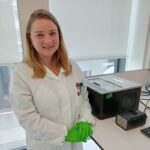Link to Pubmed [PMID] – 34417598
Link to DOI – 10.1093/nar/gkab705
Nucleic Acids Res 2021 Nov; 49(19): e113
DNA methylation is widespread amongst eukaryotes and prokaryotes to modulate gene expression and confer viral resistance. 5-Methylcytosine (m5C) methylation has been described in genomes of a large fraction of bacterial species as part of restriction-modification systems, each composed of a methyltransferase and cognate restriction enzyme. Methylases are site-specific and target sequences vary across organisms. High-throughput methods, such as bisulfite-sequencing can identify m5C at base resolution but require specialized library preparations and single molecule, real-time (SMRT) sequencing usually misses m5C. Here, we present a new method called RIMS-seq (rapid identification of methylase specificity) to simultaneously sequence bacterial genomes and determine m5C methylase specificities using a simple experimental protocol that closely resembles the DNA-seq protocol for Illumina. Importantly, the resulting sequencing quality is identical to DNA-seq, enabling RIMS-seq to substitute standard sequencing of bacterial genomes. Applied to bacteria and synthetic mixed communities, RIMS-seq reveals new methylase specificities, supporting routine study of m5C methylation while sequencing new genomes.

